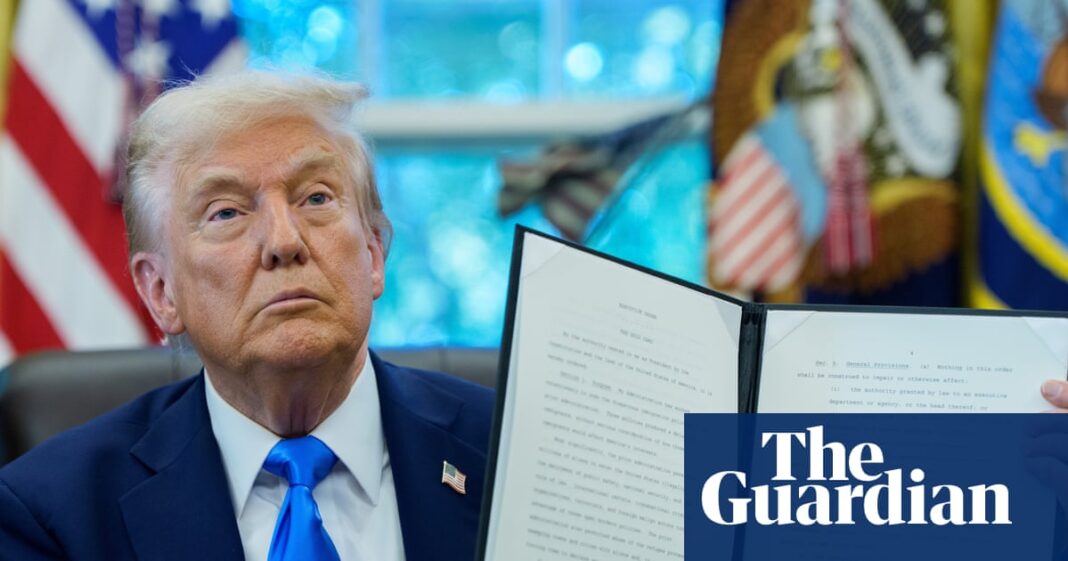Trump’s New H-1B Visa Fee: An Overview
On a recent Friday, former President Donald Trump made a significant move that could reshape the landscape of the U.S. tech industry by signing a proclamation imposing an annual $100,000 fee on H-1B visa applications. This new directive has raised eyebrows among industry leaders who heavily rely on skilled workers from countries like India and China.
Background on H-1B Visas
The H-1B visa program has been a cornerstone for U.S. employers seeking to fill specialized positions, particularly in technology. Each year, the program allocates 65,000 visas for workers in specialized fields, with an additional 20,000 reserved for those holding advanced degrees. The tech industry is particularly dependent on this program, with approximately two-thirds of H-1B visa holders working in computer-related jobs.
Impact on Tech Giants
During a press briefing, U.S. Commerce Secretary Howard Lutnick highlighted that all major companies had been briefed on this new fee structure. “A hundred-thousand dollars a year for H-1B visas, and all of the big companies are on board,” he stated confidently. This hefty price tag could drastically shift hiring practices, urging companies to favor local talent over foreign expertise.
Rhetoric Around American Jobs
Lutnick emphasized a nationalistic approach to the workforce: “If you’re going to train somebody, you’re going to train one of the recent graduates from one of the great universities across our land. Train Americans. Stop bringing in people to take our jobs.” This viewpoint resonates with a segment of the electorate who argue that H-1B visas undermine American workers by keeping wages low and sidelining local talent.
The Tech Industry’s Response
Despite the potential drawbacks, many leaders in the tech sector, including Elon Musk of Tesla, defend the H-1B visa program. They argue that it is vital for attracting the world’s top talent, which in turn drives innovation and ensures competitiveness on a global scale. Musk himself was once an H-1B visa holder, reflecting the program’s importance to entrepreneurs seeking to build their businesses in the U.S.
Economic Ramifications for Startups
The proposed fee could disproportionately impact smaller tech companies and startups, which often operate on tighter budgets. Many fear that the high costs will discourage innovation and inhibit the U.S. economy’s growth potential. Venture capitalists like Deedy Das warn that imposing significant fees creates disincentives to attract global talent, ultimately stifling creativity and progress.
Legal Concerns Over the Fee
Amidst the sweeping changes, immigration experts are questioning the legality of such a fee. Aaron Reichlin-Melnick from the American Immigration Council asserted that the president lacks the legal authority to impose a $100,000 fee, stating, “The only authority Congress has ever given the executive branch here is to charge fees to recover the cost of processing the application.” This raises questions about the potential for legal challenges against the new fee structure.
Current Visa Fee Structure
Under the existing system, applicants for H-1B visas pay a much smaller fee to enter a lottery for selection. Once selected, they incur additional fees that can amount to several thousand dollars. This system hinges on employers to cover almost all of the costs associated with hiring foreign talent, making the proposed increase alarming for many within the industry.
Recent Trends in Immigration Policy
This announcement is part of a broader strategy by the Trump administration to restrict legal immigration. In recent months, the U.S. has launched programs mandating bonds for certain visa types and adopted regulations aimed at limiting H-1B access. Previous efforts to impose stricter regulations faced legal pushback and were blocked in federal court, illustrating the contentious nature of immigration policy in the U.S.
Conclusion
As the tech industry braces for the impact of this new fee, the conversation surrounding H-1B visas reveals deep divisions in attitudes toward immigration and labor in the U.S. The implications of these changes could have lasting effects on the industry and the broader American economy, positioning both political and business leaders in a pivotal debate over the future of U.S. immigration policy.



